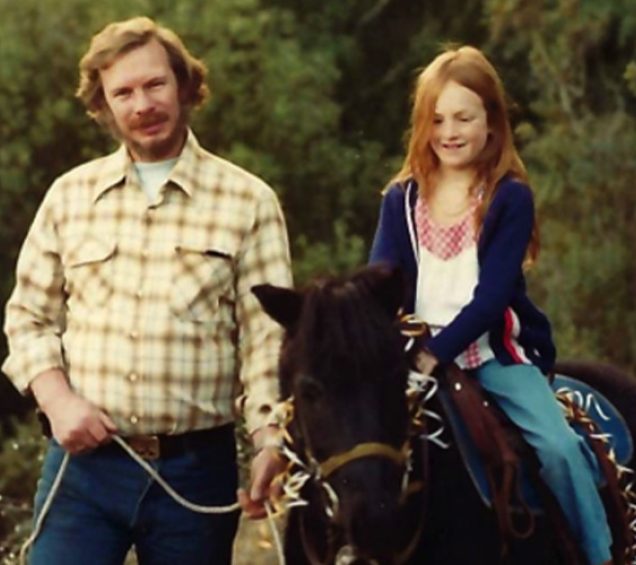I Was Worthy of a Better Life
The author/photographer (shown right) with her late father, who passed away from the disease when she was a child. Today, she celebrates more than two years of recovery.
If you did not know me or my story, you probably thought I was the classic stay-at-home mom. My kids were the center of my world. I could check all the boxes and make everything look nice and pretty in my perfectly wrapped box.
But what you could not see is that if you opened that box, if you pushed past the pleasing exterior – I was a mess. I looked like I was taking care of myself because I exercised and kept my appearance in order, but that was all on the surface.
I was turning to alcohol increasingly to cope with the internal chaos I felt at every turn. I grew up in a family that was affected by the disease of addiction and was intimately familiar with its dire consequences. However, as I later learned, that intellectual knowledge doesn’t always deter people from following those same behavioral patterns. Even when drinking made me miserable, I couldn’t imagine a better solution.
I thought I had to change my relationship with alcohol for my family. My husband and my children deserved it. It wasn’t until I went to treatment at Caron for my alcohol use disorder that I truly understood I was worthy of a better life.
It finally took the isolation of the pandemic to make me realize I had a choice. I could continue to live a lie, or I could ask for help, step out of my own way, and learn to live an authentic life – no matter how painful and uncomfortable that concept seemed.
Lessons Learned
Taking time away from my family to seek treatment for an alcohol use disorder was hard, though I was blessed in many ways. My husband has always been a very active, hands-on dad, so I didn’t have to worry about leaving directions about how to cook or do laundry.
Although my children were older and mostly self-sufficient, they were worried about me leaving home for a while and what that would entail. However, they were supportive and recognized that it was the best decision for everyone.
Of course, I was more nervous than any of my family members about going away and – more importantly – about having to change. But I also knew I was slowly killing myself, and I was ready to make a different choice.
At Caron, I discovered the value of fellowship, that there are others who suffer from the same disease who had learned how to be happy. The idea, that there was the possibility of another way to live, was mind-blowing to me.
I grieved that I wouldn't ever be able to have a healthy relationship with alcohol. It would never be enough to simply set limits on my drinking; I had an allergy of the body and the mind, absolute hallmarks of the disease, which I would never outgrow. That's not as scary to me as it once was, because I am really happy with my life today.
During treatment, I had therapy to address childhood trauma and learned to set boundaries, to say no, and to understand that it’s okay if everybody doesn’t agree with me. I developed a favorite saying, “If everybody likes you, then you know you're being too accommodating.” I came to realize it’s not healthy to care about others to the detriment of yourself.
I’ve also learned a lot about acceptance. I had a lot of denial in my life before my recovery, and that refusal would keep me stuck. Recovery has taught me that, once I accept the true situation, only then can I figure out how to deal with it.
I have also learned about a different kind of self-care, which touches on the spiritual part of life. The spirituality component of recovery has been helpful to me; I lost that before but now I know how to truly nurture my soul.
Today, I am working toward my master’s in social work. I’m helping others as I was helped. I’ve learned that plans can change, and I am okay with that. It matters less what the outside looks like and more that the inside is whole.
Take the next step:
Start with an online form
-
Caron in Pennsylvania
1-800-854-6023 -
Caron in Florida
1-800-221-6500 -
Breakthrough at Caron
1-800-213-7834




